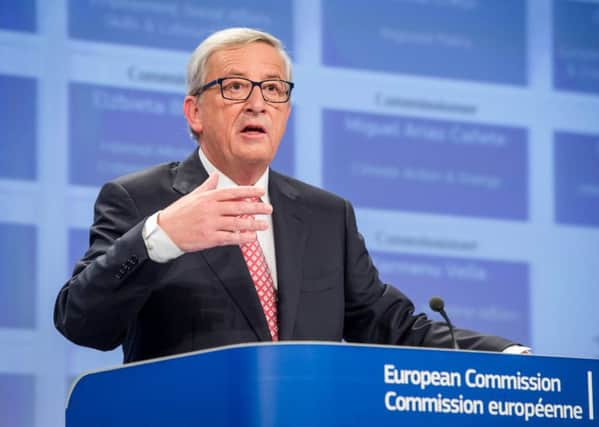Brexit is the only show in town


The really big question however was the forthcoming EU referendum. Assumptions that the vote would be to remain proved wrong, as has every poll forecast since 2014. Like the milk price and a four-day show Brexit is now a done deal. There is now only one show in town – making a success of the biggest change since EEC entry back in the 1970s.
There has always been an assumption that if the referendum were held again it would produce a different outcome. However the tactics of the European Commission and its president, Jean Claude Juncker, this week will have left leave voters more convinced than ever that they made the right decision. Even remain voters have been given a glimpse of how vindictive and small-minded Brussels can be. If they are as concerned as they now say they are about the financial and other implications of the UK leaving, they would do well to accept that they should have given David Cameron a better deal to stay. The UK will not be the last to consider exiting the EU, and Brussels needs to be more accommodating to those who see national democracy as more important than a federalist agenda – and I say that as someone who voted to remain in the EU.
Advertisement
Hide AdAdvertisement
Hide AdThe comment by Juncker that the UK cannot treat the EU like a golf club membership and just leave is bizarre. The UK has never suggested it will not meet its financial obligations, but it cannot be subjected to ridiculous funding demands, while being told that it has no right to any of the EU assets it helped to create. If Juncker wants to use golf to make his point, just as his fellow EU negotiator, Michel Barnier, sought to make fun of Theresa May’s enthusiasm for hill walking, he might do well to remember that golf is not about perfection, but about how you deal with bad shots and still score. Juncker’s tactics will make the government even more determined to score from not a bad shot but a cheap shot.
The Commission’s Brexit negotiators need to accept the more sensible words coming from the agriculture and trade commissioners, who believe a negotiated trade agreement between the EU and UK is the outcome that it needed. Juncker and the Commission negotiator and former French farm minister, Michel Barnier, are driving the UK towards a hard Brexit without a trade deal. If they do so, they will not be thanked by a devastated Irish food industry, German car makers or all the other countries supplying a market that buys more from the EU-27 than it sells to them. That is the reality of a hard Brexit, and it should be something the Commission seeks to avoid at all costs.
Juncker has never been an impressive politician. The former Luxembourg prime minister got the top EU job by default. He has never liked the UK, because it opposed his federalist ambitions to make the EU more powerful than its member states. Despite the CAP and agriculture accounting for half the EU budget he has never shown much interest in rural issues. As part of a plan to create eurozone jobs Juncker promised simplification of the CAP, but that has not happened. He let his Scottish chief scientific adviser, Anne Glover, go and scrapped the post, because she believed science should guide decision making. He does not like being challenged, and the prospect of negotiations with a tough prime minister is the biggest challenge Juncker has faced in his less than stellar political career.
The tough line from Brussels reflects a degree of financial desperation. Without the UK, as one of the shrinking number of EU paymaster countries, there will be a big hole in the budget. This is already affecting plans for the new CAP, prompting suggestions that the UK could be forced to go on funding agriculture after Brexit. Brussels has long needed to understand budget realities. It needs to trim back its spending across the board and curb its federalist agenda. It also needs to make sure the UK leaves as a friendly trading partner, and not as an enemy.